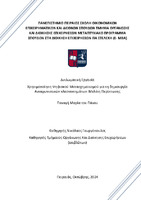Χρησιμοποίηση ψηφιακού μετασχηματισμού για τη δημιουργία ανταγωνιστικών πλεονεκτημάτων : μελέτη περίπτωσης

View/
Keywords
Ψηφιακός ; Μετασχηματισμός ; Πολυεθνική ; Ανταγωνιστικό πλεονέκτημα ; Ευκινησία ; ΠροσαρμοστικότηταAbstract
This thesis examines the use of digital transformation and the extent to which it can be utilized as a competitive advantage for General Electric Healthcare, focusing on the key limitations posed by the organization’s current strategy and its existing culture in Greece.
The purpose of this study is to explore the methods that GEHC Greece should follow to leverage digital transformation for its benefit and as a true competitive advantage, overcoming the highlighted constraints. The research is conducted using interviews.
The thesis is structured into seven chapters. The first chapter presents the categorization of multinational corporations (MNCs) and the models used to achieve competitive advantages in the global market. The second chapter explores the importance of strategic management for MNCs, emphasizing the need to adapt to a constantly changing external environment through innovation, sustainability, and the creation of knowledge-based organizations. It also analyzes the stages of strategic planning and the impact of digital transformation on business strategy.
The third chapter delves into the internal factors of MNCs, such as structure, culture, and resources, highlighting their strengths and weaknesses, which are crucial for shaping strategy and gaining competitive advantages in the market. Additionally, the significance of digital transformation, as outlined by Professor Rita McGrath, is analyzed as essential for the agility and adaptability of an organization in a rapidly evolving technological environment.
The theoretical analysis concludes that digital transformation serves as a competitive advantage for businesses that integrate it effectively, offering improved customer service and enhanced organizational adaptability to the dynamic market environment. The research conducted through interviews with three GEHC Greece employees highlighted the importance of using digital transformation as a competitive advantage for GEHC in Greece, focusing on evaluating internal processes, company culture, and strategy, as well as the need to adapt to local requirements and cultural nuances for its successful implementation.
Finally, three solutions are proposed, addressing training and support, adaptation to local needs, and infrastructure upgrades, which could further enhance digital transformation as a competitive advantage for GEHC Greece.


